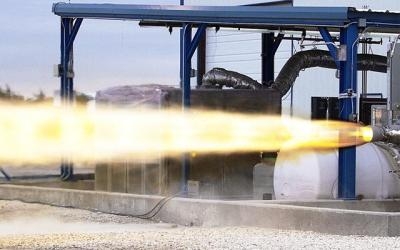Thu, Feb 02, 2012
New Video Shows SuperDraco Engine in Action
Space Exploration Technologies (SpaceX) has successfully test
fired SuperDraco, a powerful new engine that will play a critical
role in the company’s efforts to change the future of human
spaceflight. “SuperDraco engines represent the best of
cutting edge technology,” said Elon Musk, SpaceX CEO and
Chief Technology Officer. “These engines will power a
revolutionary launch escape system that will make Dragon the safest
spacecraft in history and enable it to land propulsively on Earth
or another planet with pinpoint accuracy.”

The SuperDraco is an advanced version of the Draco engines
currently used by SpaceX’s Dragon spacecraft to maneuver on
orbit and during reentry. As part of SpaceX’s
state-of-the-art launch escape system, eight SuperDraco engines
built into the side walls of the Dragon spacecraft will produce up
to 120,000 pounds of axial thrust to carry astronauts to safety
should an emergency occur during launch.
NASA’s Commercial Crew Program awarded SpaceX $75 million
in April of last year to begin work developing the escape system in
order to prepare the Dragon spacecraft to carry astronauts. Less
than nine months later, SpaceX engineers have designed, built and
tested the engine. In a series of recent tests conducted at the
company’s Rocket Development Facility in McGregor, Texas, the
SuperDraco sustained full duration, full thrust firing as well as a
series of deep throttling demonstrations.
SpaceX’s launch escape system has many advantages over
past systems. It is inherently safer because it is not jettisoned
like all other escape systems. This distinction provides astronauts
with the unprecedented ability to escape from danger at any point
during the launch, not just in the first few minutes. The eight
SuperDracos provide redundancy, so that even if one engine fails an
escape can still be carried out successfully.
SuperDracos can also be restarted multiple times if necessary
and the engines will have the ability to deep throttle, providing
astronauts with precise control and enormous power. In addition, as
a part of a recoverable Dragon spacecraft, the engines can be used
repeatedly, helping to advance SpaceX’s long-term goal of
making spacecraft more like airplanes, which can be flown again and
again with minimal maintenance between flights.
More News
Terminal Radar Service Area Airspace surrounding designated airports wherein ATC provides radar vectoring, sequencing, and separation on a full-time basis for all IFR and participa>[...]
Aero Linx: Utah Back Country Pilots Association (UBCP) Through the sharing experiences, the UBCP has built upon a foundation of safe operating practices in some of the most challen>[...]
From 2010 (YouTube Edition): Imagine... Be The Change... Inspire FROM 2010: One of the more unusual phone calls I have ever received occurred a few years ago... from Anousheh Ansar>[...]
(Pilot) Felt A Shudder And Heard The Engine Sounding Differently, Followed By The Engine Chip Detector Light On April 14, 2025, about 1800 Pacific daylight time, a Bell 206B, N1667>[...]
Also: AMA Names Tyler Dobbs, More Falcon 9 Ops, Firefly Launch Unsuccessful, Autonomous F-16s The Air Force has begun ground testing a future uncrewed jet design in a milestone tow>[...]
 ANN's Daily Aero-Term (05.07.25): Terminal Radar Service Area
ANN's Daily Aero-Term (05.07.25): Terminal Radar Service Area ANN's Daily Aero-Linx (05.07.25)
ANN's Daily Aero-Linx (05.07.25) Classic Aero-TV: Anousheh Ansari -- The Woman Behind The Prize
Classic Aero-TV: Anousheh Ansari -- The Woman Behind The Prize NTSB Prelim: Bell 206B
NTSB Prelim: Bell 206B Airborne-NextGen 05.06.25: AF Uncrewed Fighters, Drones v Planes, Joby Crew Test
Airborne-NextGen 05.06.25: AF Uncrewed Fighters, Drones v Planes, Joby Crew Test



